Covid-19 Australia: West Australian Premier Mark McGowan delays border reopening
West Australian Premier Mark McGowan has postponed the state’s reopening amid a surge in Omicron cases and pressure on the hospitals.
Coronavirus
Don't miss out on the headlines from Coronavirus. Followed categories will be added to My News.
Western Australia’s border reopening has been delayed in response to the Omicron outbreak that is wreaking havoc across the rest of the country.
The state had previously flagged plans to open its border on February 5 to doubled-vaccinated interstate and overseas travellers.
Instead, the border will only reopen to approved travellers on that date - with exemptions granted to people on compassionate grounds, those requiring medical treatment, and returning Western Australians.
Those with specialist skills and others facing extraordinary circumstances will also be granted an exemption to enter the state.
WA Premier Mark McGowan said the state is not taking any chances - arguing the highly infectious variant poses a significant risk to the community.
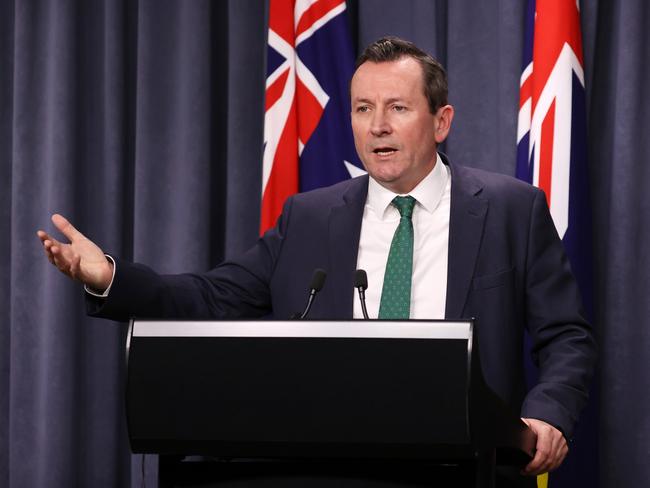
“I know this decision will be unpopular with many people ... for that I am sorry. I understand exactly what this means for many people who were hoping to reunite without any restrictions,” Mr McGowan said.
“It would be reckless and irresponsible to open up now – I can’t do it.”
In addition to being triple vaccinated if eligible, approved travellers will be required to undertake 14 days of home quarantine and return a negative rapid antigen test 24 hours to departure.
They will also be required to take a PCR test within 48 hours on arrival and on day 12 of self-quarantine.
Mr McGowan said WA will review the border settings on Feb 5, but says the government ideally wants to pause the state’s reopening until it reaches 80-90 per cent triple vaccination against Covid.
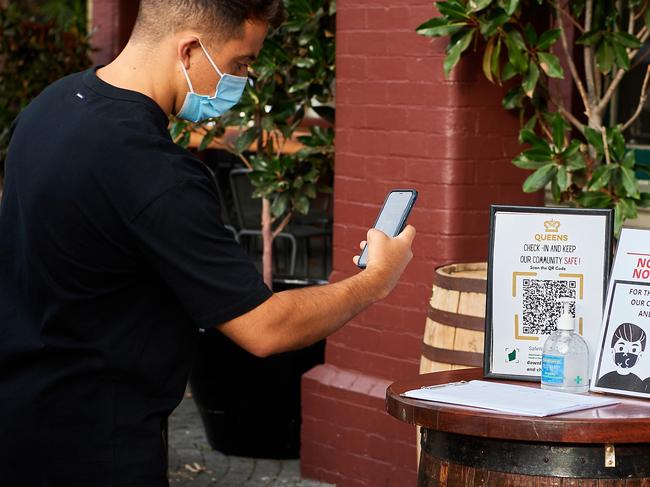
He predicted the state will be only 35-38 per cent triple vaccinated on that date.
“We know the third dose of the vaccine gives us the best protection,” Mr McGowan said.
“Even doubled dosed vaccinated people aren’t strongly protected against Omicron, Omicron is a whole new threat we can’t ignore.”
The Premier argued the original reopening plans were made before the highly infectious Omicron variant arrived and spread rapidly across the Eastern part of the country.
WA will continue to monitor the Omicron outbreak in other parts of the country, McGowan said, before the state commits to a border reopening date.
“What we are going to do is review the situation over February…and what’s happening over East.”
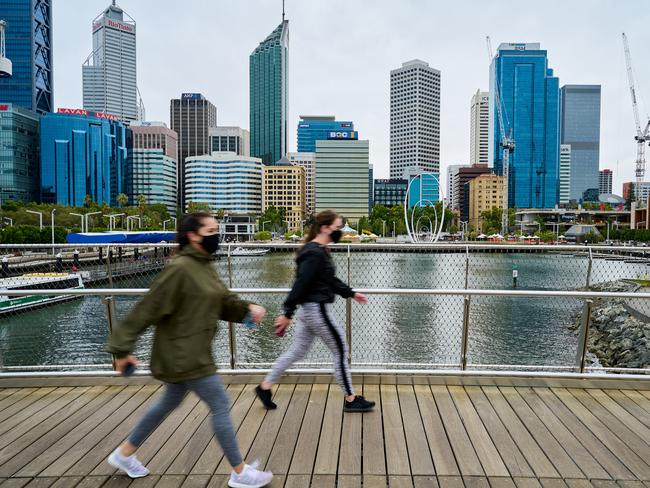
He dismissed suggestions the delay was due to pressures on the health system, which is reportedly already under strain despite the state’s zero covid strategy.
When asked why WA’s health advice differed from other Australian jurisdictions, Chief Health Officer Andy Robert said the state was an outlier compared to the covid-ravaged parts of the country.“We are in a vastly different position than those states, they are now dealing with a disease which is way more transmissible than they planned for even with 80-90 per cent protection [against coronavirus].”
SA RECORDS DEADLIEST COVID DAY
Meanwhile, South Australia has recorded its highest ever number of Covid-19 related deaths over a 24 hour period. The state recorded 3777 new cases on Thursday as well as 11 deaths in two women and nine men, aged between their 50s and 90s.
Premier Steven Marshall said he spoke to chief public health officer Nicola Spurrier about the “unusually large” number of deaths.
“She said it’s quite possible it was an accumulation for a number of days,” he said.
“There is no urgent reporting requirement from residential aged care facilities in to SA Health related to Covid so sometimes there is a bit of a catch up.
“Nevertheless, its very sad news today and we express our sincere condolences.”
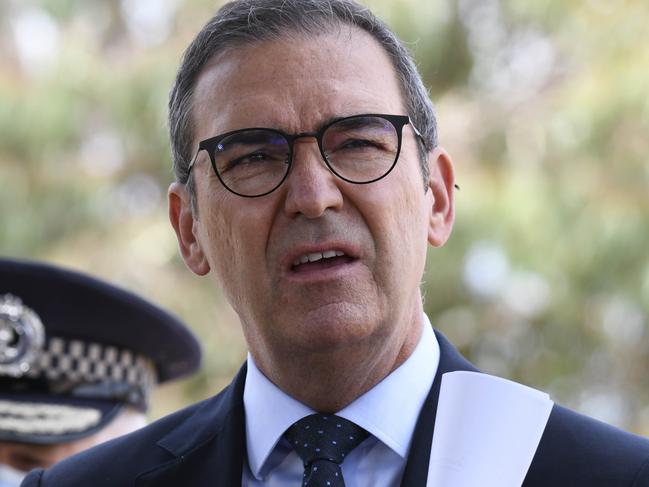
While today’s daily figure was higher that yesterday’s 3482 infections and three deaths, Mr Marshall said it was still below the seven day average.
Currently, 290 people are in hospital, down from 294, while 29 people are in intensive care and nine are on ventilators.
On Wednesday, there were only four ventilated patients.
The state’s daily number of infections has gradually decreased after it reached a record 5679 cases last Friday.
The double dose vaccination rate for residents aged 12 and over has now reached 90 per cent.
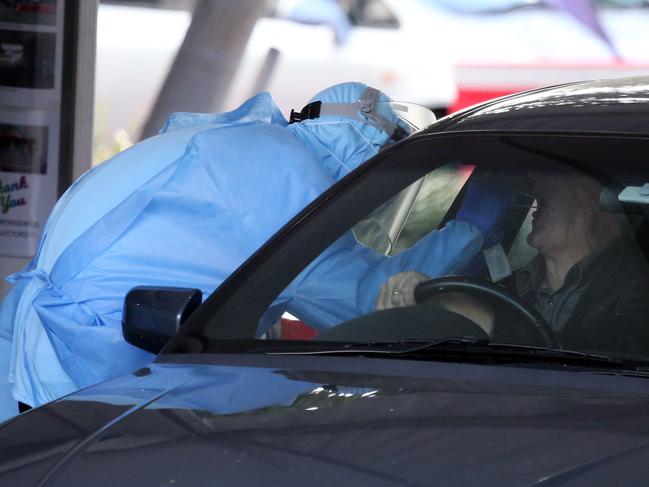
Meanwhile, the premier has ruled out cutting down quarantine time for Covid positive patients, despite authorities in other jurisdictions considering decreasing the required isolation time to just five days.
Ahead of Thursday’s national cabinet meeting where the topic will be discussed, Mr Marshall was quick to rule out slashing the quarantine time which currently stands at 10 days.
He also rejected the idea of reducing the time to seven days, but said it could be considered in future.
“It’s very clear to me that we still have a huge number of people with symptoms after day five, and we would just be literally lighting a fire in South Australia if we allow them to leave quarantine after five days,” the premier told ABC Radio.
“They would just be out there infecting other people and then we’d have another wave.
“It's possible that could change down the track but we certainly won’t be signing up to that today.”
NEW MYSTERY CASE FOR WA
A mystery case of Covid-19 has been detected in Western Australia, as the state recorded five new local cases with some infectious in the community.
WA Health said four of the local cases are contacts of previously reported cases, with two in quarantine and two potentially infectious in the community.
“The fifth case ... has currently not been linked to any known cases,” WA Health said in a statement on Thursday.
“This person has been infectious in the community.
“Contact tracers are now working with these cases to determine potential exposure sites.”
There were also five travel-related cases overnight.
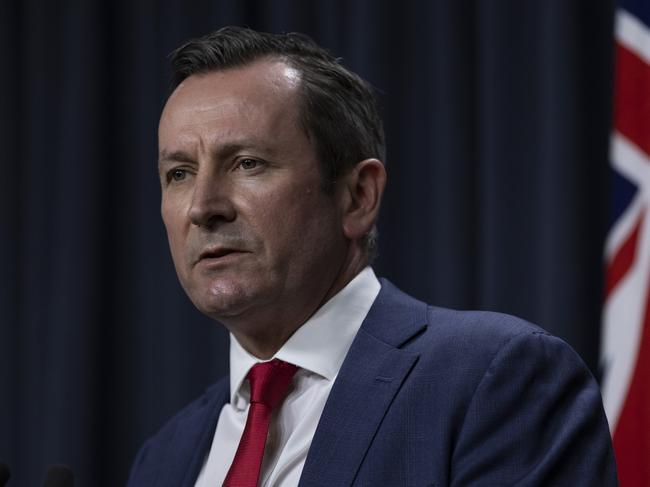
There are now 79 active cases in WA, with 23 in hotel quarantine, 56 in self-quarantine and none in hospital.
The full list of exposure sites can be found here.
“WA Health has identified potential higher risk Covid-19 exposure in East Victoria Park, Northbridge, Osborne Park, Applecross and Mount Lawley,” the statement read.
People who visited those sites at the times listed should get tested immediately and self-quarantine.
Meanwhile, authorities are continuing to monitor two vessels off the WA coast, with both recording positive results from rapid antigen tests.
“All positive crew members on-board these vessels are isolating in their cabins and being monitored safely,” WA Health said.
Premier Mark McGowan has been under pressure to reveal what restrictions will be in place when the border comes down on February 5.
NOVAVAX APPROVED IN AUSTRALIA
Covid vaccine Novavax has been green lit by Australia’s national drug regulator, with authorities “hoping” the handful of adults yet to be jabbed will now come forward.
The Therapeutic Goods Administration on Thursday announced it had granted provisional approval to Novavax, meaning the jab will only need to be approved by the nation’s peak vaccine body before widespread use.
Novavax is the first protein Covid-19 vaccine to receive regulatory approval in Australians and could turn out to be a game changer for vaccine sceptics.
TGA head Professor John Skerritt said Novavax was based on “older” vaccine technology, compared to the newer technology used to developed mRNA jabs-like Pfizer and Moderna’s version-and the AstraZeneca jab.
“There are some individuals, and even social media groups who have for whatever reason been worried about new technology, even though the foundational technology for these vaccines such as Pfizer and Moderna and for other vaccines such as AstraZeneca have been around for some years,” he said.
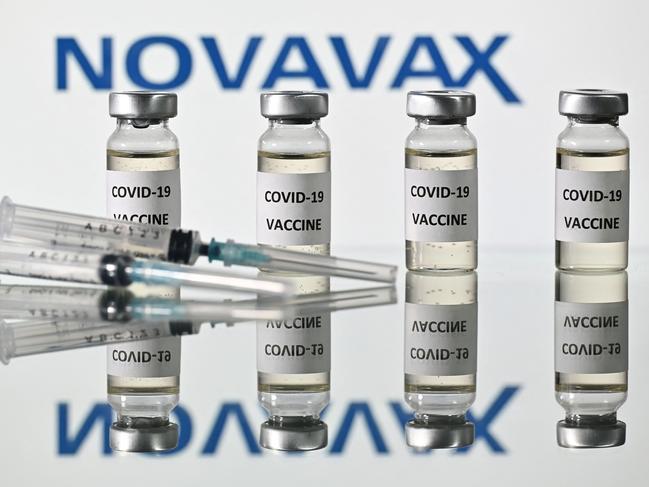
Federal Health Minister Greg Hunt said “some people had waited” for Novavax, and “hopefully” the approval of the jab will encourage some of the remaining 5 per cent of the unvaccinated adult population to come forward.
“The next stage is ATAGI, and subject to their approval it will be made available over the coming weeks to be distributed through states and territories, general practices, and pharmacies that seek to order it,” he said.
The jab will be available to people aged 18 and older for primary vaccination against Covid-19, with further work needed to determine if it can also be used as a booster shot.
TGA chief Professor John Skerritt said Novavax would be administered as two doses, with the second delivered three weeks after the first.
He said the company’s clinical trial data was “quite impressive”, showing a 90 per cent efficacy rate against symptomatic infection.
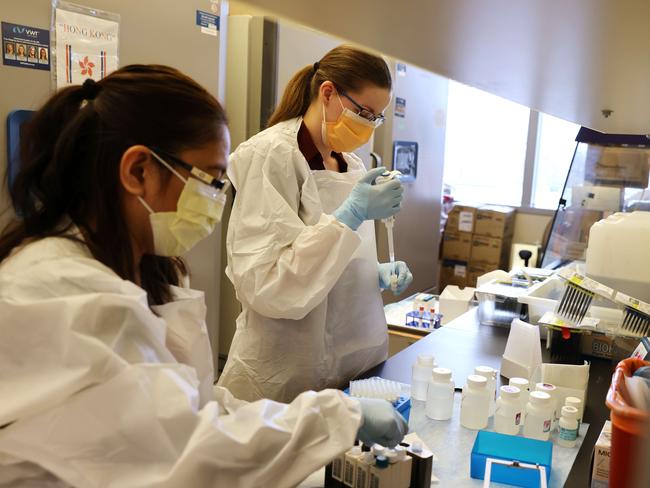
Studies into the use of Novavax in children and as boosters are ongoing.
The government placed an advanced order of 51 million doses of the jab in January 2021, with the option of buying an additional 10 million doses.
Novavax chief executive Stanley C. Erck said the TGA’s approval reflected the company’s “increasing momentum around the globe around the globe”.
“While the world continues to grapple with the ever-changing nature of the virus, we look forward to delivering our vaccine to the people of Australia,” he said.
“We would also like to extend our gratitude to the Australian clinical trial participants who contributed so significantly to the development of our vaccine.”
Overall, nearly 1500 Australians have participated in Novavax Covid-19 and combination vaccine clinical trials according to the company, including in Phase 1 and Phase 2 clinical trial and a booster trial.
COVID PILLS APPROVED FOR USE IN AUSTRALIA
The first oral treatments for Covid in Australia have also been given the green light.
The Therapeutic Goods Administration has confirmed it has given provisional approval for the use of the Pfizer pill, Paxlovid, and Merck’s Lagevrio.
“Both of these products, which are the first oral treatments to be approved for Covid-19 in Australia, have been granted provisional approval for the treatment of adults with Covid-19 who do not require initiation of oxygen and who are at increased risk of progression to hospitalisation or death. Neither product is intended to be used as a substitute for vaccination against Covid-19,” the TGA said in a statement on Thursday.
The pills need to be taken as soon as possible after diagnosis of Covid-19 and within five days of the start of symptoms.
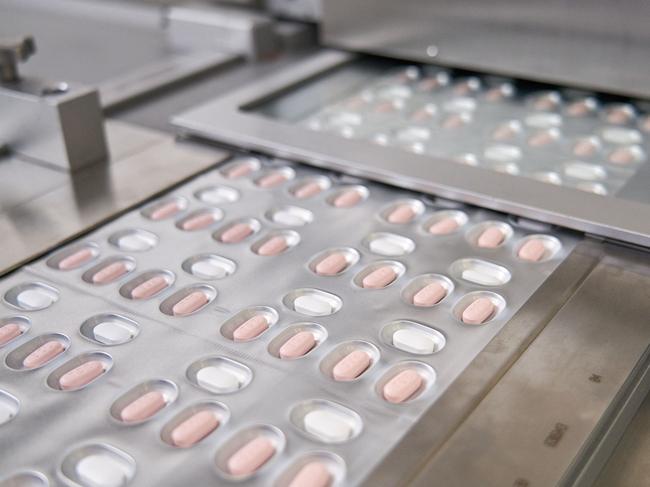
Lagevrio is available as capsules, while Paxlovid is made up of separate tablets of nirmatrelvir and ritonavir. In both cases, the medicines are taken twice a day for five days.
The Australian Government has secured access to 500,000 treatment courses of Paxlovid and 300,000 courses of Lagevrio for supply during 2022.
Health Minister Greg Hunt told ABC Radio the products were expected to arrive in coming weeks, after the government secured 500,000 courses of Paxlovid and 300,000 courses of Lagevrio.
“They will help people who are at increase risk of going from mild to moderate and deemed by medical professionals to have the risk of progression of more serious conditions,” Mr Hunt said.
“They are expected to arrive in the coming weeks.
“(They) will build on what we’re already doing through the intravenous or hospital treatments.”
VIC: 21,966 NEW CASES, 15 DEATHS
Victoria has recorded 21,966 new Covid cases as the state’s health system continues to face extreme pressure.
The state recorded 15 deaths on Thursday and 1206 hospitalisations.
Of those in Victorian hospitals, 122 were in intensive care, including 40 on a ventilator.
Victorian Premier Daniel Andrews this week called the strain being placed on the state’s health system as “unavoidable” after a code brown was enforced.
“It is very, very challenging at the moment – the system is under unique and unprecedented pressure, it is unavoidable in every way,” Mr Andrews said.
“This virus has infected, or has isolated literally thousands and thousands of health workers, and people are doing the best that they can.”
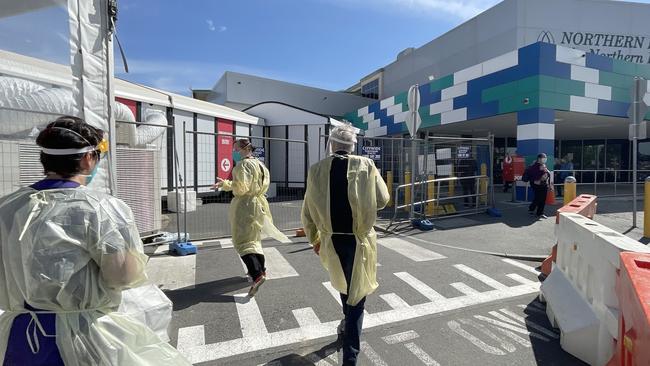
The state this week slashed the time needed between booster shots in a bid to address the crisis and ease the pressure on the system.
Victorians are now eligible for their third dose if it has been three months since their last Covid vaccine.
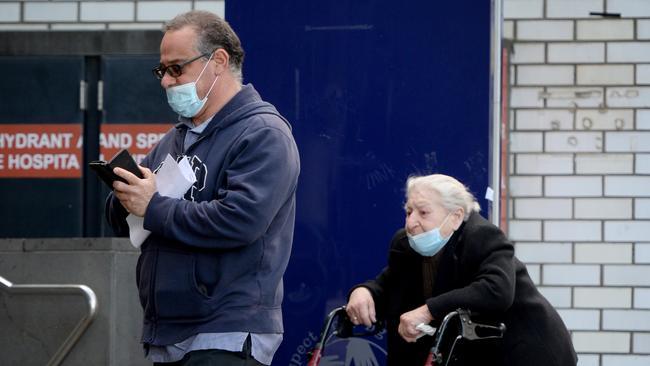
The Premier said the third dose could soon become mandatory in the state.
The numbers of Victorians who have received two doses currently stands at 93 per cent.
“I think we’re very close to a change in policy that will simply reflect the fact that in order to be fully protected you need to have three doses,” Mr Andrews said.
“To be fully protected, to be fully vaccinated, to have fully played your part, you need three doses.
“I don’t rule out there being other groups that become the subject of a mandate.”
NSW: 30,825 NEW CASES, 25 DEATHS
NSW has recorded 30,825 new Covid cases and the deaths of 25 people with the virus on Thursday.
There are 2781 people in the state’s hospitals with coronavirus, with 212 of those in intensive care, down from 2863 and 217 respectively on Wednesday.
Health officials said 13,178 of the new infections were detected on rapid antigen tests and 17,647 were found through PCR testing.
As of Thursday, 95.3 per cent of people in NSW aged over 16 have had one dose of a Covid vaccine, 93.8 per cent have had two and 29 per cent have received a booster.
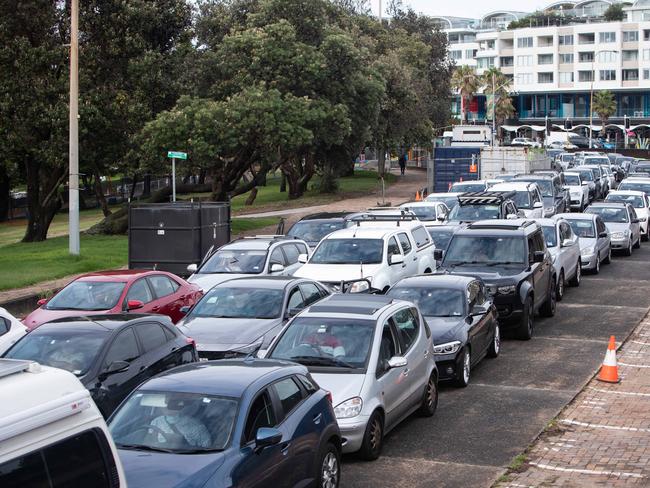
QLD: 16,812 NEW CASES, NINE DEATHS
Another nine people have died from Covid in Queensland - including an 18-year-old with significant underlying conditions - as the state reported 16,812 new infections.
Thursday’s update revealed Covid hospitalisations in the Sunshine State had risen from 835 to a new high of 850, while there were 48 Covid patients in intensive care, down from 52 in the past 24 hours.
Twenty people are on ventilators.
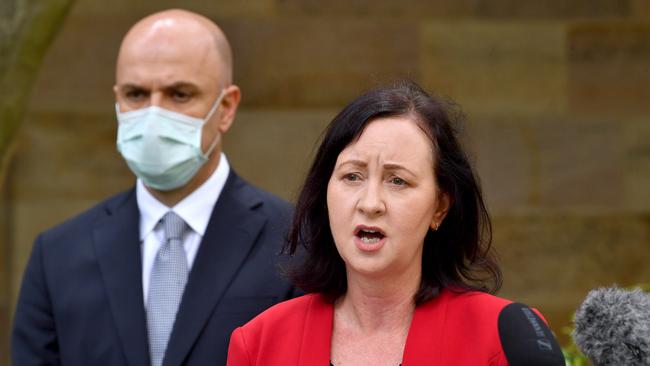
The peak of the Omicron wave is expected to hit the Gold Coast before anywhere else in the state with health minister Yvette D’Ath on Thursday revealing 70 per cent of tests were coming back positive for the region.
There are seven dedicated Covid wards on the Gold Coast dealing with patients.
Deputy Premier Steven Miles also announced the Wellcamp quarantine facility at Toowoomba will soon be up and running, with 500 beds to become available in February to ease pressure on the state’s quarantine system.
State government announced the regional facility last August after striking a deal with the landowner, the Wagner Corporation, with Mr Miles declaring the project “incredible value for money, even as the state prepares to ease international travel rules.
The first 250-bed pod at Wellcamp will be used for travellers who need to quarantine, and the second is for Queenslanders whose accommodation is not suitable for isolation.
NEW BATTLE FOR WA
Western Australia recorded two new local cases of Covid-19 on Wednesday, including one person who was infectious in the community and forced a dozen health staff into self-quarantine.
Health Minister Amber-Jade Sanderson said one of the new cases was an unvaccinated man aged in his 50s, who was linked to the Cockburn cluster and had been in quarantine.
The second person is a vaccinated man, aged in his 60s, who has been transferred to hotel quarantine since his diagnosis.
Authorities are trying to understand how he may have contracted the virus, but he is believed to be linked to the Cockburn cluster too.
Ms Sanderson said the man lived with four other men, who were also placed into quarantine and had been tested.
“While the man is vaccinated, he has not been in quarantine for his whole infectious period and therefore, as contact tracing continues, exposure sites will be published,” she told reporters on Wednesday.
“This man has presented to an emergency department (at Fiona Stanley Hospital) having had some respiratory illness.”
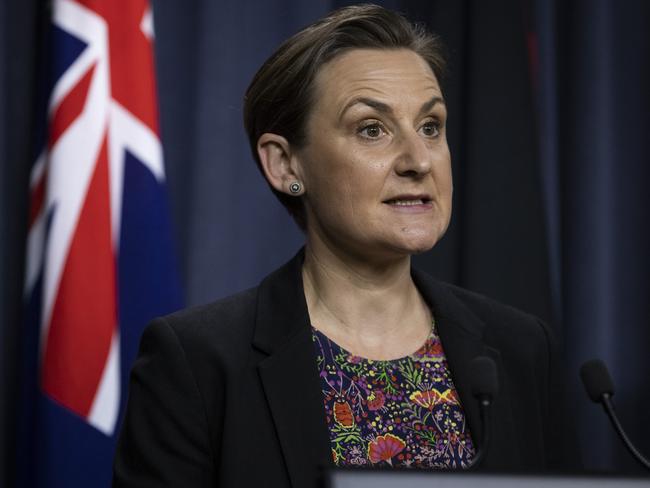
But the minister said the man was not admitted to the hospital and he was instead managed under Covid protocols.
“While staff were wearing PPE, there are several (12) staff considered contacts from the hospital visit and they will self-quarantine as a precaution with the exact time frame determined based on their individual contact with the case,” she said.
Ms Sanderson said the close contact staff might return to worker sooner than 14 days if they test negative.
Three interstate cases in quarantine were also recorded overnight.
Ms Sanderson said WA was monitoring 82 active cases, with 25 in hotel quarantine, 57 in self-quarantine and no one in hospital.
She said there were 34 active cases of the Omicron variant.
“We do still hold serious concerns around Omicron in the community,” she said.
“Omicron is lurking so we need to be vigilant and prepared.
“We do assume that Omicron is in the community to some extent.
PM SAYS ANTI-VAX MP ‘ALLOWED TO SPEAK MIND
Deputy Prime Minister Barnaby Joyce has refused to confirm whether or not controversial Queensland MP George Christensen will be removed from a lucrative parliamentary role for spouting vaccine misinformation.
Mr Christensen, in promoting an episode of his podcast, inferred parents should not get their children vaccinated against Covid-19 — comments the Prime Minister has labelled “dangerous”.
Mr Joyce, in Brisbane on Wednesday, did confirm he had spoken to the Nationals-aligned Mackay-based MP earlier in the day and on Tuesday.
He declined to provide details about the chat.
“His comments are not backed up by the medical evidence of people proficient in that field, and therefore his comments are at odds with me,” Mr Joyce said.
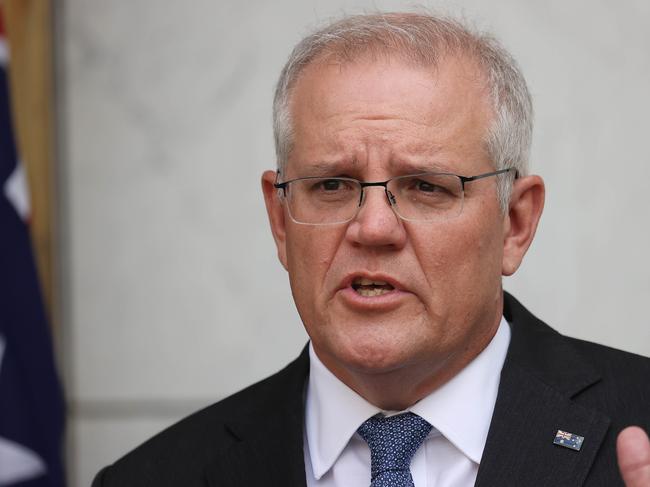
The Deputy Prime Minister also declined to say if Mr Christensen would be removed from his role as head of a parliamentary committee,
“I’m not going to go into those deliberations even though I have been in discussions with the Prime Minister this morning about those issues,” he said.
Earlier, Scott Morrison has condemned the “unwise and dangerous” anti-vaccine conspiracy theories being spread by Mr Christensen but stopped short of kicking him out of the coalition.
“Australia is a free country — you can’t go around locking people up for what they say as Australians,” Mr Morrison told reporters in Canberra on Wednesday.
“He is allowed to speak his mind but Australians should not be listening to him.”
The Prime Minister has been under pressure to pull his backbenchers into line after a small but vocal group continue to spread Covid-19 vaccine misinformation on social media.
Australian Medical Association vice president Dr Chris Moy earlier called on Mr Morrison to reign in the “nutty” behaviour of Mr Christensen and other colleagues.
“It is frustrating that this sort of nutty stuff which is essentially converted into some sort of cause to raise popularity really has a foothold, and it’s driven by a particular type of advocate, which unfortunately we are seeing some … of them within the government,” he told the ABC.
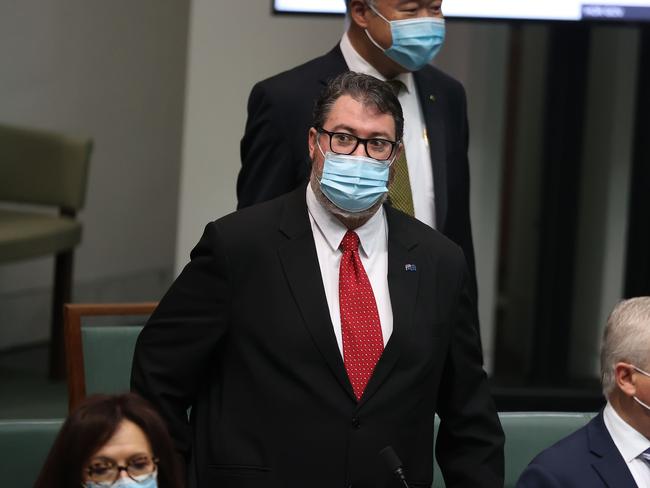
“They really do need to shut up because they are not helping what we need to do and it is causing increasing anxiety. What they are saying is rubbish.”
“It has got to end. It has gone too far and unfortunately it will be looked back on as something that has undermined our ability to do the right thing and maintain confidence in key aspects of things such as the vaccination program.”
The Prime Minister was forced to make a statement late Tuesday evening, urging parents to ignore Mr Christensen’s views.
“It is contrary to the official professional medical advice provided to the Government, and I urge parents to disregard his dangerous messages in relation to vaccines,” he said in a statement.
“If you are not vaccinated against the virus you are more likely to experience severe illness and die. Getting vaccinated saves lives.
“This is the clear advice to all Australians, who are eligible to have a vaccine, from Australia’s chief medical officer.”
BOOSTER JAB WAIT TIME SLASHED
More than three million NSW residents have become eligible for their Covid-19 vaccine boosters after the state government slashed the waiting period between second and third doses.
The 40 state-run vaccine hubs from Wednesday will administer a booster shot to people three months after their second dose, reduced from four months.
NSW Premier Dominic Perrottet announced the change on Wednesday morning after a run of unfilled appointments at the state vaccine clinics.
“We have the capacity for 250,000 vaccines every week in those hubs. Today’s decision will enable over 3.5 million more people from our state to be eligible for that booster shot,” he told reporters.
“As we are clearly seeing, boosters are key to keeping yourself, your friends and your family safe. We have the capacity available. We’ve seen in our intensive cares the difference vaccination makes.”
He thanked healthcare workers and the wider community for “the sacrifices everyone has made”.
“The rules aren’t there for the sake of it, they’re there to keep you safe. We are making our way through it and we will make our way through it,” he said.
The wait period between second and third doses will be reduced from four months to three months from the end of January at GPs and pharmacies, in line with commonwealth government guidelines. Victorian Premier Daniel Andrews also announced people in his state would also able to get a booster dose within three months of their second dose.
The change was planned for the end of the month but has been brought forward, meaning 1.2 million more Victorians have become eligible for their booster.
“Nothing is more important than getting a third dose and getting vaccinated,” Mr Andrews said.
“It’s critical to us getting to a peak and starting to see these numbers come off and getting back to something like normal.”
NSW Health Minister Brad Hazzard said almost 50 per cent of Covid patients in the state’s intensive care units were unvaccinated.
“We want to see the booster rate increase as dramatically and quickly as possible,” he said.
NSW chief health officer Kerry Chant stressed the urgency of increasing third dose vaccination rates as quickly as possible, as the state continues to record tens of thousands of daily cases.
VISA FEES SCRAPPED
The Morrison government will scrap visa application fees for backpackers and international students in a bid to reduce disruption to the supply chain.
Over the next eight weeks, international students who apply to study in Australia will no longer have to pay a $630 visa application fee.
Backpackers who apply to come to Australia will also have their visa application fees waived.
Scott Morrison said the new measures will apply to 23,500 backpackers, and 150,000 students.
“My message to them is: come on down,’’ he told reporters in Canberra on Wednesday.
“Come on down now because you wanted to come to Australia, you got your visa, we want you to come to Australia and enjoy a holiday here in Australia, move all the way around the country, and the same time join our workforce and help us in our agricultural sector, in our hospitality sector, and so many of the other parts of the economy that rely on that labour.”
HUNT’S COVID SURGE PLAN
Health Minister Greg Hunt has activated three key measures to deal with a surge of Omicron as pressure on the health system reaches its highest level since the pandemic began.
Speaking at a press conference at Parliament House on Tuesday afternoon, Mr Hunt said the next phase of the “Omicron response plan” would focus on supporting hospitals and aged care facilities and also assisting states and territories with personal protective equipment and rapid antigen tests.
“We are here to … announce the next stage in our Omicron response plan, as has been planned, prepared and anticipated for any surge in either case numbers or hospital numbers,” Mr Hunt said.
He said the first element would be enacting a private hospital agreement, which was established in March 2020, to support public hospitals.
It will mean 57,000 nurses and more than 100,000 staff are made available to Omicron-affected areas around the country.
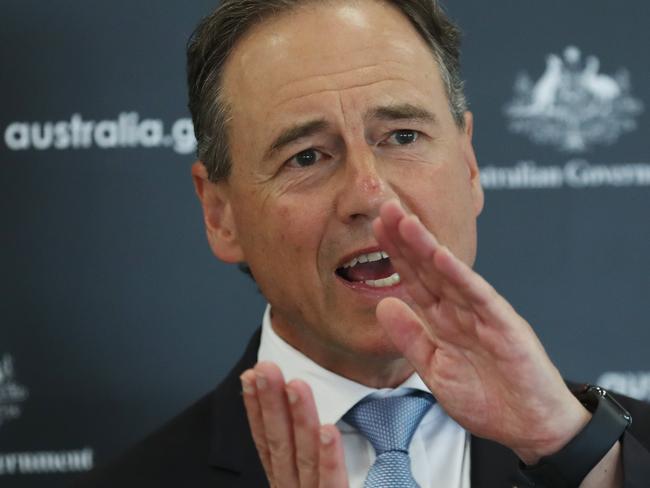
Mr Hunt said the national medical stockpile would also be activated, providing states with PPE if they had shortages, along with more than 10 million additional RATs.
The third step is to support the aged care sector, with 10 million units of protective gear and 5.6 million tests.
“That’s an important additional protection to be made available to our aged care sector,” Mr Hunt said.
“We have provided over 2.3 million rapid antigen tests already just in 2022 to our aged care facilities.”
Chief medical Officer Paul Kelly said Omicron was putting huge pressure on the health system.
“We have been planning for workforce pressure in our healthcare sector for some time, right back to actually the beginning of the pandemic,” Professor Kelly said.
“This is the first time that the health system has come under pressure to the extent that we’re seeing in the last week or two.”
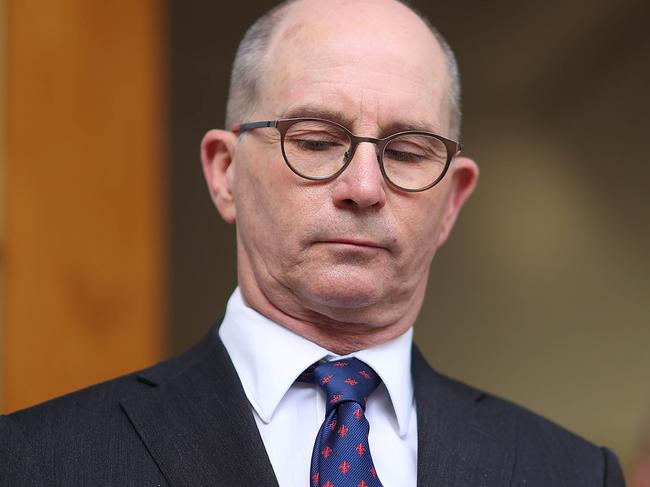
Professor Kelly conceded there were still many unknowns with Omicron that made the future in Australia unclear.
He warned this winter would mean having to grapple with flu-rona (coronavirus and the flu).
“I think winter, we will see more Covid. That’s been the case in every winter so far, in all parts of the world,” he said.
“We’re almost certainly going to have a flu season this year as well in winter.
“Flu and coronavirus together, as has been seen in several countries in the northern hemisphere right now, is a challenge.”
MORE RAPID TESTS TO ARRIVE ‘WITHIN WEEKS’
The nation’s stock of rapid antigen tests is expected to remain low until February when Australia’s biggest pharmacy distributor expects a “real jump” in supply.
Sigma Healthcare is currently delivering tens of thousands of rapid antigen tests to its Amcal stores each week, The Australian reports.
Weekly deliveries will be increased over the coming weeks to several million before distributing tens of millions of tests to pharmacies by mid February.
Demand for rapid tests has soared as the highly infectious Omicron variant infects more than 100,000 Australians each day.
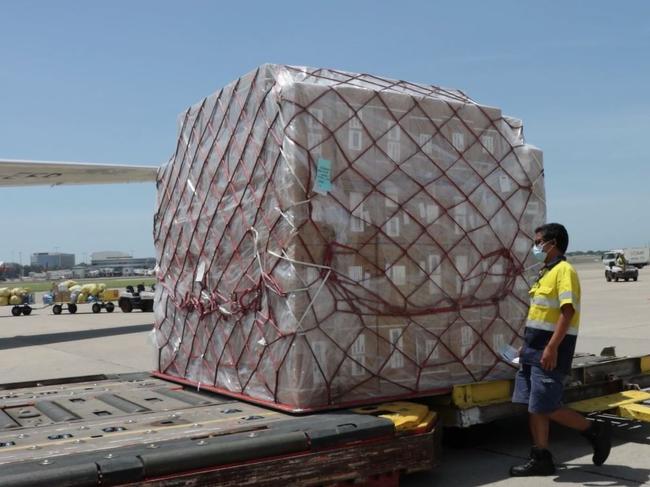
Some retailers are charging up to $500 a test, according to the Australian Competition and Consumer Commission. Wholesale prices range from $3.95 to $11.45 a test, prompting the competition watchdog to crackdown on price gouging.
It comes as unions are threatening strike action unless bosses provide new protections against Omicron, including providing free rapid antigen tests for staff who cannot work from home once supply shortages are overcome.
The Australian Council of Trade Unions also wants employers to provide staff with N95 masks and has drawn a line in the sand against moves to make staff work while Covid positive in order to head off supply outages.
ACTU secretary Sally McManus said the union had written to employers telling them it expected to see new Covid safe plans rolled which take into account the different nature of Omicron.
Ms McManus said while unions understood supply shortages of RATs meant bosses could not source them at the moment, they should be rolled out widely when they became freely available and workers.
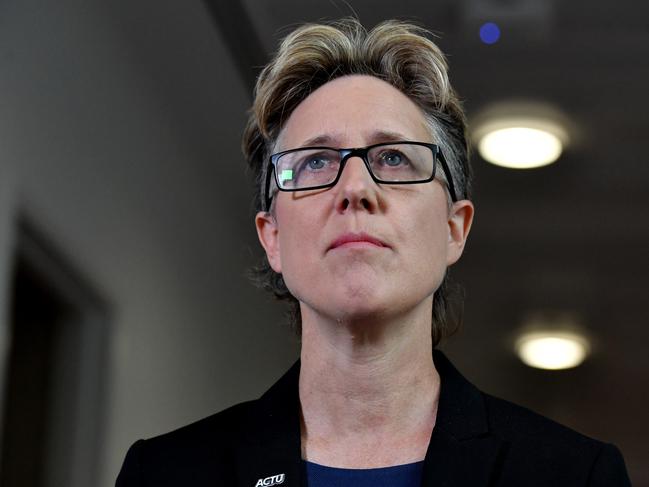
Workers should not pay for them and the government should foot the bill, Ms McManus said.
“When those tests do come on-board in a whole lot of workplaces where you can’t work from home they are going to be absolutely essential and at the moment we have some employers trying to force people to go to work while they are Covid positive,” Ms McManus told Today on Tuesday.
“That is the type of example where workers do have a right to stop work.”
Critical workers at a South Australian abattoir who were Covid positive but showed no symptoms were given an exemption to go to work earlier this month in order to ensure the state’s meat supply was not interrupted.
The warning from the nation’s peak union comes as education unions push back against changes which allow Victorian teachers who have been in close contact with a Covid case to skip isolation requirements.
Exempt workers must take a rapid antigen test each day and wear a mask.
The ACTU released the demands after a crisis meeting of union leaders on Monday, as key employer groups said business needed more flexibility to manage Covid-19.
Ms McManus attacked the “let it rip” approach of Scott Morrison and business, demanding every employer undertake a “new risk assessment for Omicron” that would include providing staff with free RAT tests, upgraded masks and improved ventilation.
PM’S BOLD CLAIM ABOUT TESTS
Scott Morrison says Australia is not the only country in the world suffering from a shortage of rapid antigen tests, as union leaders demand more support from the government amid worker shortages and supply chain pressure.
The tests, which are now being counted in daily case numbers in most states, continue to be in short supply and many of those that are available are being sold at a premium.
Some tests are now being distributed for free at selected testing centres, with more expected to come online when supply becomes available, but the government is under pressure to quickly source more.
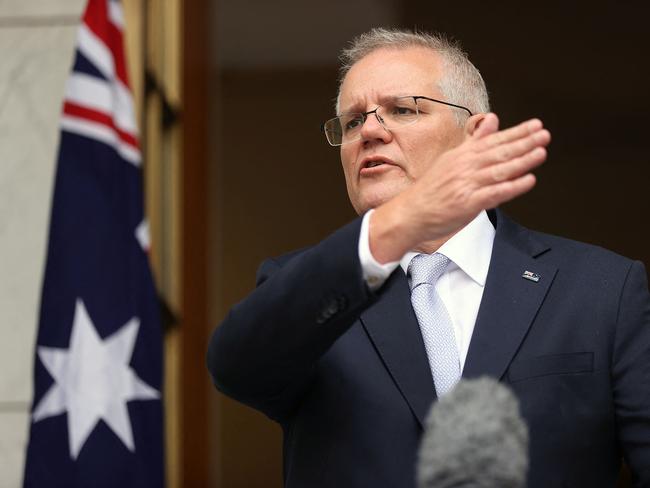
The Prime Minister is pushing back against criticism that the government should have been stocking up on the kits back in August, saying they had “no idea” how much Omicron would change the game.
“We were buying them in August as a federal government to meet the requirements that we had in aged care. That’s what’s being used right now,” he told 2GB on Monday.
“Back in August and even September we were dealing with Delta – and what we were focused on then was getting those vaccination rates up.
“Omicron has changed absolutely everything. Most people now know someone, or indeed have had Covid. That wasn’t true six months ago
“It’s been a very different virus … And the rapid antigen tests are in short supply around the world.
“This is not something that is unique to Australia. It’s part of dealing with Omicron. Omicron has disrupted everything.”
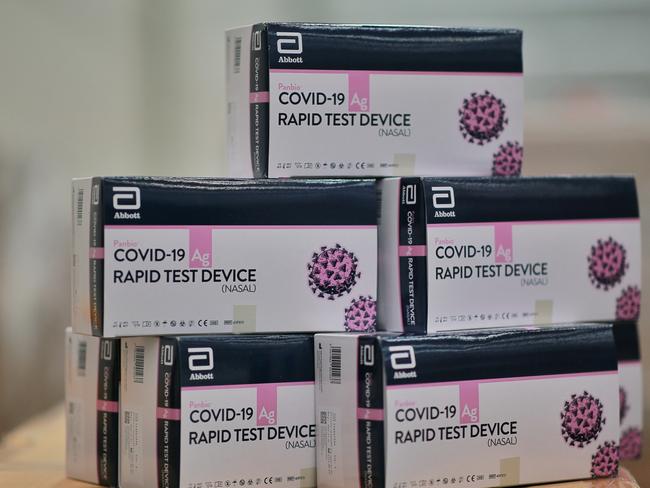
It comes as the Australian consumer watchdog released its initial findings into the price gouging of rapid antigen tests, finding that kits purchased wholesale for between $4 and $12 are being sold at $20-$30, and at up to $70.
Australian Competition and Consumer Commission chair Rod Sims said suppliers and retailers had been contacted about their price gouging.
“The supply chain is often complex … Retailers operating under the same brand or chain may be setting prices and selling tests independently of other stores in the chain,” Mr Sims said.
“This means the wholesale and resulting retail prices can vary differently.
“Our inquiries so far confirm that a large volume of orders have been placed. However, given delays in the supply of tests into Australia, delays in distribution due to Covid illness or isolation requirements within workforces and at the retailer level, there is significant difficulty forecasting accurate supply.”
Mr Sims said the “excessive pricing” or rapid antigen tests was of significant concern to the watchdog.
“We realise demand and supply chain issues have been impacted since then, but our initial research suggests that a price of around $20 per test or more, however packaged, may be hard to justify based on the average wholesale costs and such retailers should explain why the price is so high,” Mr Sims said.
“Any test costing more than $30, even with supply constraints, is almost certainly too expensive and would seem to be taking advantage of the current circumstances.”
More Coverage
Originally published as Covid-19 Australia: West Australian Premier Mark McGowan delays border reopening




